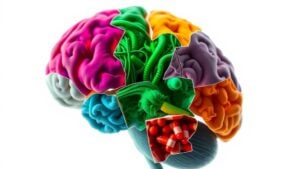Ever notice your short-term memory slipping lately? You’re not alone, and there’s likely a reason behind it. Perhaps you’re not sleeping enough, or stress is fogging up your thoughts. Certain meds or thyroid issues could also be playing tricks on your recall, while that extra drink could be doing more harm than you consider. Let’s analyze what’s really going on—you’ll want to see which of these hits close to home.
Lack of Sleep and Its Impact on Memory Retention
Every time you don’t get enough sleep, your brain struggles to hold onto memories like it normally would—because deep sleep is each time it locks in what you’ve learned.
Sleep deprivation messes with your cognitive function, making it harder to focus and recall things. In case you’re constantly tired, forgetfulness becomes a frustrating habit.
Chronic poor sleep doesn’t just hurt short-term recall—it weakens long-term memory too, since your brain can’t properly store what you’ve learned. Conditions like sleep apnea or anxiety make it worse, keeping you from the deep rest your brain needs.
Without enough quality sleep, your attention slips, and even simple tasks feel harder. Fixing sleep disorders or improving your rest can help sharpen your memory and keep your mind clearer.
The Role of Thyroid Function in Cognitive Decline
Your thyroid—a small but powerful gland in your neck—plays a surprising role in how sharp your memory remains. At the onset, sluggish hormone production can throw your brain into slow motion, leading to memory impairments and fuzzy pondering.
You may notice you’re forgetting simple tasks or struggling to focus—classic signs of cognitive decline linked to thyroid dysfunction. The positive aspect? A simple blood test can spot imbalances, and hormone replacement therapy often reverses these cognitive problems.
Left unchecked, untreated thyroid issues worsen mental clarity, but addressing them promptly can restore your cognitive function. Don’t brush off fatigue or forgetfulness—your thyroid could be whispering for help. Pay attention, get tested, and take back control of your memory.
Alcohol Consumption and Its Effects on Memory
Whilst thyroid health can cloud your memory, another factor—alcohol—hits your brain’s short-term storage even harder. Regular drinking disrupts cognitive functions, making it harder to form new memories or recall recent events.
Here’s how alcohol messes with your mind:
- Blackouts and gaps: Heavy alcohol consumption blocks the brain from transferring info to long-term storage, causing sudden memory blanks.
- Long-term damage: Even when sober, regular drinking shrinks gray matter, speeding up decline in memory over time.
- Moderation matters: Sticking to one drink a day (two for men) helps protect brain health and reduces impaired memory risks.
If you’ve noticed alcohol-related memory issues, cutting back can make a difference.
Your brain’s resilience surprises you—give it a chance to recover.
Stress and Anxiety as Contributors to Memory Issues
Should stress or anxiety have ever left you staring blankly at a page, struggling to recall what you just read, you’re not alone.
Chronic stress floods your brain with cortisol, a hormone that weakens neural connections needed for memory recall. Anxiety, on the other hand, can block access to old memories, making it hard to retrieve even familiar details.
At times you’re burdened, cognitive overload kicks in, scattering your concentration and leaving little room for new information.
The positive aspect? Effective stress management—like deep breathing or short walks—can calm your mind and sharpen cognitive function.
Small changes, like breaking tasks into chunks or practicing mindfulness, help reduce cortisol’s grip.




